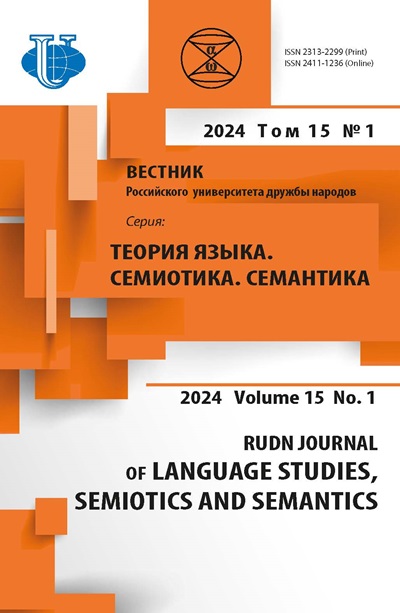LANGUAGE GAME: PARADOX AND ABSURD
- Authors: Uzbekov TS1
-
Affiliations:
- Uzbekistan State University of World Languages
- Issue: Vol 8, No 3 (2017)
- Pages: 735-745
- Section: Articles
- URL: https://journals.rudn.ru/semiotics-semantics/article/view/17035
- DOI: https://doi.org/10.22363/2313-2299-2017-8-3-735-745
Cite item
Full Text
Abstract
This article deals with the problem of similarities and differences between paradox and absurd as a phenomenon of language and speech. This problem deals with logics and philosophy, therefore the paradox and the absurd are considered as interdisciplinary facts of language and speech which are characterized by irregularity and alogism. The notion of the absurd and the paradox are analyzed on basis of its interpretation in linguistics, philosophy and logics. Similarities and differences in their content are analyzed and are concluded as different in same and same in difference. The main differences of these types of the language game are: a) there are irregularity, seeming alogism and sense in the paradox; b) there are irregularity, alogism and nonsense (because there is no sense in it) in absurd. Absurd as the type of the lan-guage game is defined as a factor of the development of logical and alogical in the process of forming lingual sense of the individual and society. It makes improvement of abilities and skills in the process of speech. Paradox is unusual, nonstandard thinking, opinion, statement, which disclaims well-known point of view, therefore the paradox contains logicality and alogism. Paradox isn’t nonsense or absurd, it always has a sense. As a type of the language game, paradox forms logical thinking, i.e. it performs educational function. The Object of the investigation is word play in language and speech. Types of word play- an ab-surd and a paradox are the subject of the investigation. Method of the analysis is found on the basis by using the method of innerlingual comparison and by method of stylistic replacement of synonyms in contexts, where paradox and absurd function. The sources of the investigation are explanatory, philosophical and logical dictionaries, in which interpretation of the absurd and the paradox and literary texts are presented.
Keywords
About the authors
T S Uzbekov
Uzbekistan State University of World Languages
Author for correspondence.
Email: timuzbekov@mail.ru
Uzbekov Timur Sakenovich, PhD student of Uzbekistan State university of world languages; Research Interests: lexicology, word formation, stylistics, Russian philology
Kichik halka yuli str., block G9a., 21A, Tashkent, Uzbekistan, 100138References
- Gorbachevich, K.S. (Ed.). (2004). The Great Academic Dictionary of the Russian Language. Vol. 1. Moscow, Saint Petersburg: Nauka. (in Russ).
- Dzhusupov, M. (1991). Phonic system of the Russian and Kazakh languages. Syllable. Interfe¬rence. Teaching of pronunciation. Tashkent: Fan. (in Russ).
- Dzhusupov, N.M. (2016). Active stylistically relevant processes as a result of foregrounding of linguistic deviations (using the materials of English and Russian). Vestnik RUDN: Educational problems: languages and speciality, 1, 19—27. (in Russ).
- Ivin, A.A. & Nikiforov, A.L. (1997). The dictionary of logic. Moscow: VLADOS. (in Russ).
- Nikitin N.V. (2006). Ontology of corporality: senses, paradoxes, absurd. Moscow: Kogito-Centr. (in Russ).
- Gorkin, A.P. (Ed.). (2005). Great Encyclopedic Dictionary. Moscow: Bol'shaja Rossijskaja jenciklopedija: RIPOL classic Publ. (in Russ).
- Norman, B.Ju. (2006). The game on the faces of language. Moscow: Flinta, Nauka. (in Russ).
- Ozhegov, S.I. & Shvedova N.Ju. (2011). The Explanatory dictionary of the Russian language. Moscow: Mir i Obrazovanie, Oniks. (in Russ).
- Sannikov V.Z. (2002). The Russian language in mirror of language game. Moscow: Jazyki sla¬vjanskoj kul'tury. (in Russ).
- Tokarev D.V. (2002). The course on the worst: absurd as a category of text of Daniel Harms and Samuel Beckett. Moscow: Novoe literaturnoe obozrenie. (in Russ).
- Frolova I.T. (2001). Philosophy: the Encyclopedic Dictionary. Moscow: Respublika (in Russ).













